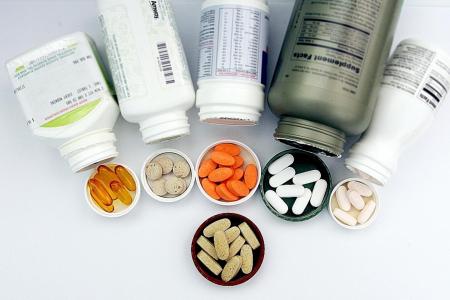Are supplements necessary for you?
Some vitamins are already found in most foods or can be harmful in excess
Every day, many people take health supplements, which include a range of vitamins and minerals that add to the nutrients we already get through our diet.Mr Louis Yap, a dietitian at Mount Elizabeth Novena Hospital, advises doing a health check prior to taking any form of supplement as blood tests may show what may be deficient in the body. Also, a dietitian may pinpoint the potential lack of food groups that links to the deficiency in certain nutrients.
"If one is skipping these steps, then make sure the supplement is from a reliable source and to check the expiration date," he added.
Here are the most common supplements and why you should or should not take them.
VITAMIN C
This vitamin works as an antioxidant and reduces the harmful effects of free radicals, which are reactive particles generated in the cells from bodily processes such as breathing, breaking down food and toxins. Vitamin C is also important for forming collagen, a vital part of the connective tissue found in our skin, bones, joints and gums.
Should you take it: Since vitamin C is commonly found in fruit and vegetables, you probably will not need supplements if you eat enough of them.
Said Mr Yap: "It is found in most foods, to meet the requirement of 105mg for men and 85mg for women. For example, a 3/4 cup of orange juice contains 93mg of vitamin C, while about 100g of broccoli (one serving) will provide 51mg."
You could take a vitamin C supplement in certain situations.
Said Dr Julinda Lee, a gynaecologist at Wellness & Gynaecology Centre who also has a master's in human nutrition and functional medicine: "Supplementation may be useful in the case of excessive stress - like increasing physical training and in stressful circumstances - to reduce the likelihood of viral infection, and can also be considered at the onset of symptoms of a viral infection to reduce the likelihood of developing a full-blown illness or to reduce the severity of symptoms."
What you should note: The good thing about vitamin C is that it is soluble, so even if it is consumed in excess, it is excreted from the body and unlikely to cause any harm except for side effects such as abdominal cramp or diarrhoea.
OMEGA-3 OR FISH OIL
Our bodies cannot make omega-3 fatty acids, they can be obtained only from our diet or through supplementation. The most common sources of omega-3 are fatty or oily fish, dark green leafy vegetables, nuts and seeds. Omega-3 fatty acids are good for brain development and also reduce inflammation in the body.
Should you take it: Dr Lee said that individuals who have a diet high in vegetables, good quality meat or egg and fatty fish do not require omega-3 fatty acid supplementation. But those who have increased inflammation - which can manifest as excessive aches, depression, heart disease or diabetes - or are vegans or avoid consumption of oily fish may need to consider supplementation.
What you should note: However, Mr Yap cautioned about the amount to take, saying: "It was documented that a high dosage of omega-3 (3g a day) may risk bleeding, abnormal heart rhythm or cardiovascular disease. A 1g dose would be sufficient."
There are non-fish-related omega-3 supplements for those who prefer plant-based options.
CALCIUM
This mineral is best known for its role in bone health, and dairy products are often heralded for their high calcium content and importance for reducing the risk of osteoporosis and related fractures. Non-dairy products that are also sources of calcium include green leafy vegetables, sardines with bones, fortified cereals, almonds and soya products such as tofu and soya milk.
Should you take it: Dr Lee said: "Osteoporosis - an increased porousness and fragility of bones - is often thought of as a woman's disease, as pregnancy, lactation and the drop in oestrogen levels in menopause increase the rate of bone loss.
"Calcium supplementation is typically seen in women who may start this supplement as early as their first pregnancy. Many Asians are unable to tolerate milk and this is often the reason for being on calcium supplementation."
What you should note: Mr Yap said a high dosage of calcium that hits the upper limit of 2,500mg a day may risk developing soft tissue calcification, kidney stones, cardiovascular disease and constipation. Keep calcium and iron supplements at least two hours apart (if taking both) as they compete for absorption.
IRON
The main function of iron is to transport oxygen in the red blood cells throughout our body. It also has a role in the production of some tissues such as keratin in hair and nails. You can get iron from red meat and dark green leafy vegetables although it may be more poorly absorbed from the latter.
Should you take it: Women are at a greater risk of iron deficiency and can develop anaemia (a reduction in haemoglobin in the blood), which commonly presents as pallor and tiredness, said Dr Lee. This is due to the monthly menstrual blood loss. So women with heavy menstrual blood loss often supplement with iron. Women who are vegan or vegetarian may also find it hard to have sufficient dietary iron, she added.
What you should note: Iron supplement is notorious for its effect on the gastrointestinal system, especially constipation. Iron in excess can accumulate within tissues and result in damage to these tissues through the generation of free radicals. It is therefore important to supplement with iron only when blood tests confirm a deficiency, said Dr Lee.
This article was first published in Shape (www.shape.com.sg)
Get The New Paper on your phone with the free TNP app. Download from the Apple App Store or Google Play Store now




